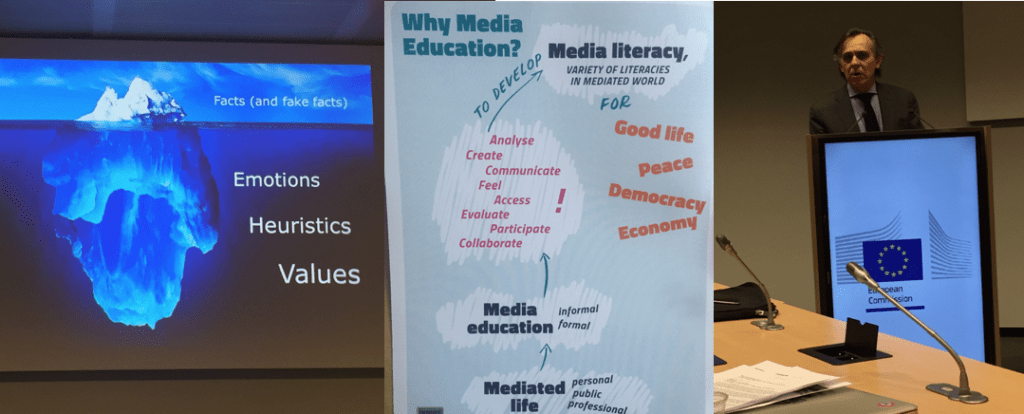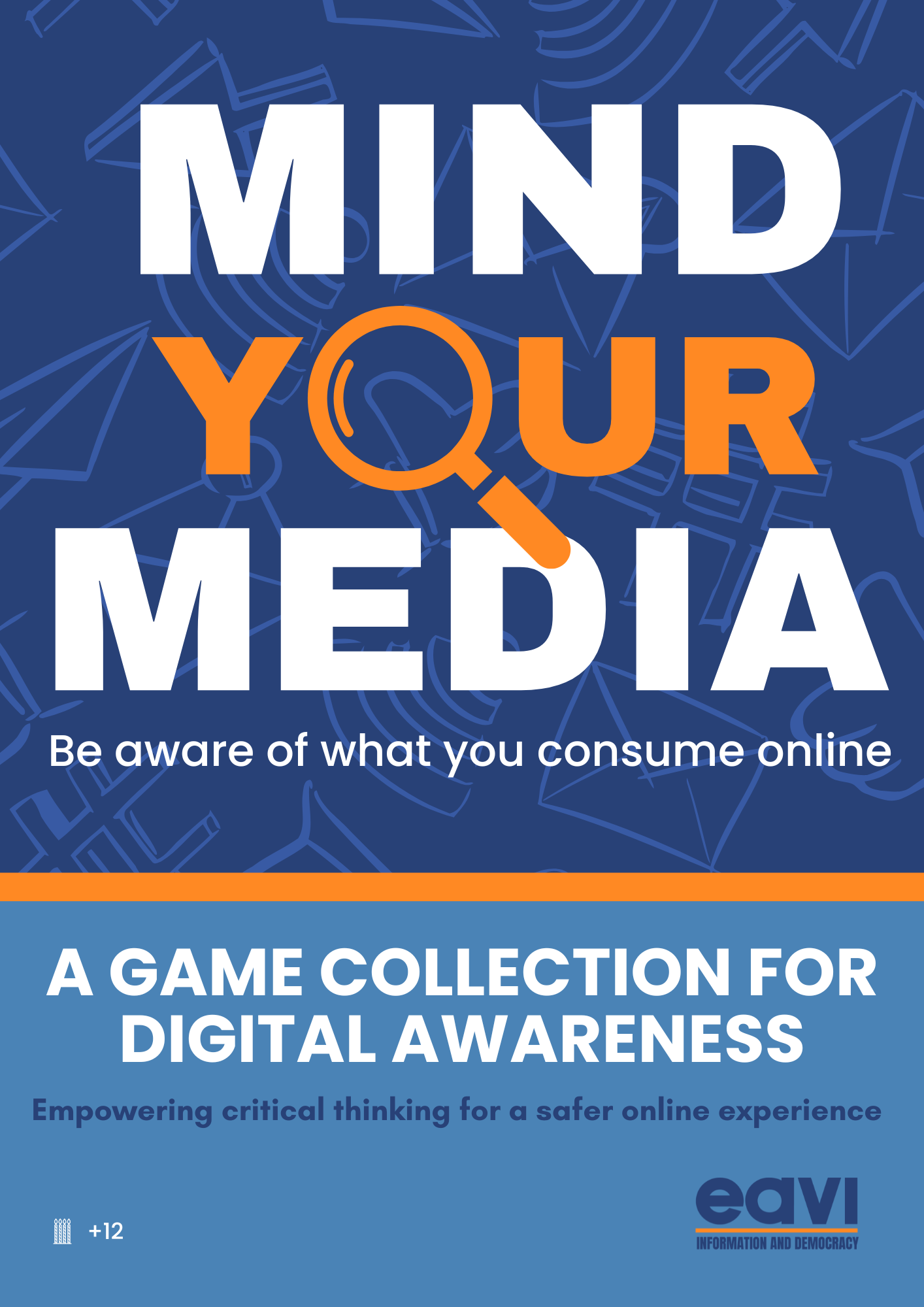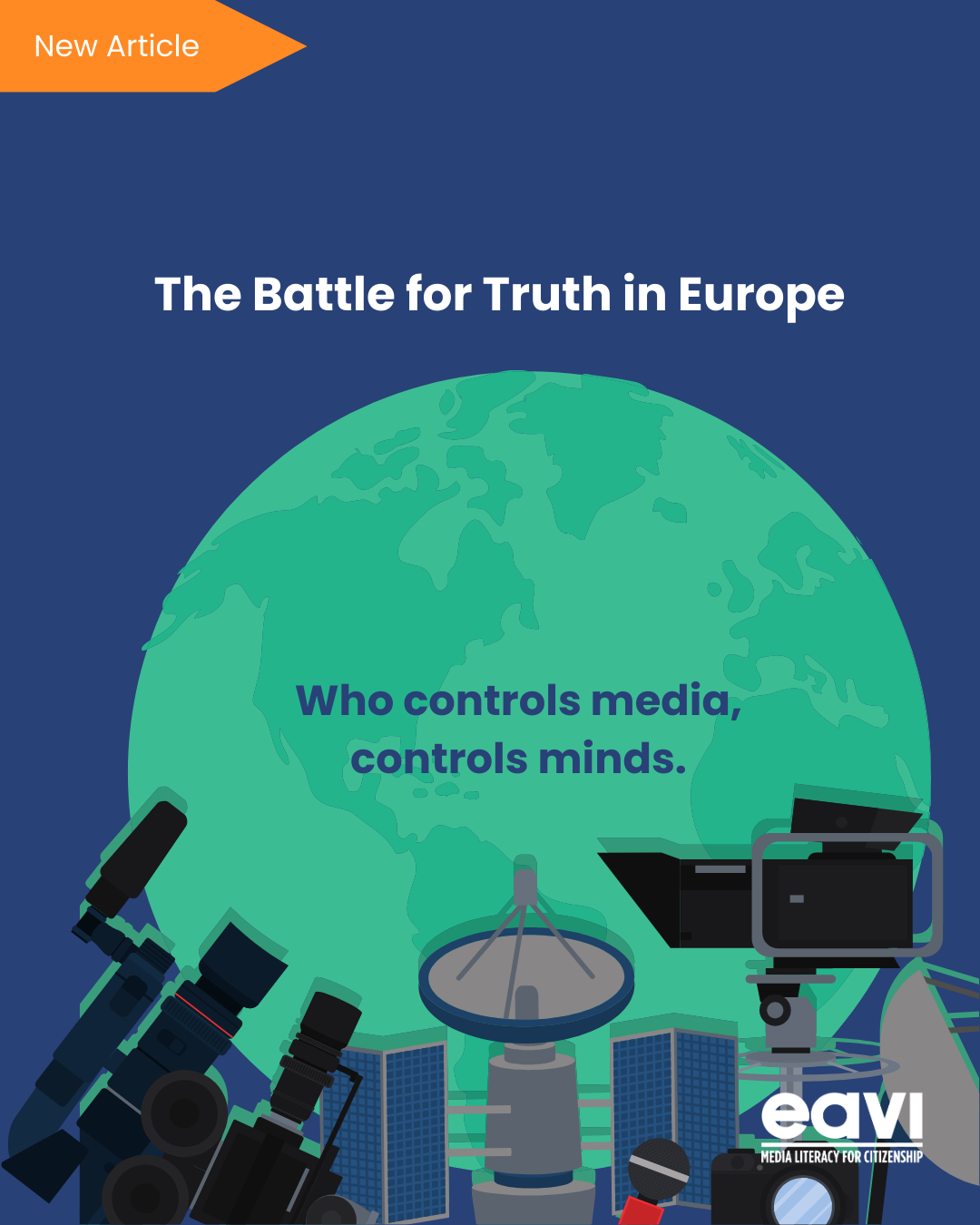
A preliminary note
The European Commission invited EAVI to participate in its Media Literacy Experts Group. Presentations and exchanges were extremely interesting. A proper report will follow, for the time being, in a concise format a preliminary note.
A number of Members States representatives have illustrated the respective initiatives including Sweden, Nederland, Malta, Greece, Finland, Austria, Latvia, Estonia, France, Spain, UK, Belgium and also Norway.
New EU media literacy funded projects were presented respectively by Johanna Krawczyk for Evens foundation ‘Mind Over the Media’ and Angela Rees ‘Media in Action’.
We are glad to notice that organisations already collaborating with EAVI, including the EBU, the National Audiovisual Insititute in Finland, Lie Detectors, the Alliance des Journalists and the EFJ, also presented or participated to the meeting.
Divina Frau Meigs noticed that when it comes to fake news, technological innovation seems to have brought a very conservative revolution.
The European Commission representatives stressed the importance of media literacy and framed this debate around fake news and social media. Google and Facebook representatives illustrated their excellent initiatives, but also reiterated their rhetoric about not being responsible for the content they convey to the users.
In this respect, the Joint Research Centre of the European Commission, Ian Vollbracht, brilliantly exposed the relevance of behavioural science and traditional marketing techniques on users’ interactions choices online.
Paolo Celot of EAVI repeated that social media are well aware about our brain works online and they obviously act accordingly to serve their own interests. Yet responsibility to possess complex technical and cognitive skills is currently placed solely on citizens. The debate should therefore be evidence-based and encompass the effectiveness of facts-checking services or self-regulations measures. Paolo furthermore demanded Google and FB cooperation in releasing at least some of their data to researchers contributing to analyse the phenomenon of fake news.
An eye-opening video about how social media organise your access to political and commercial information here!

A preliminary note
The European Commission invited EAVI to participate in its Media Literacy Experts Group. Presentations and exchanges were extremely interesting. A proper report will follow, for the time being, in a concise format a preliminary note.
A number of Members States representatives have illustrated the respective initiatives including Sweden, Nederland, Malta, Greece, Finland, Austria, Latvia, Estonia, France, Spain, UK, Belgium and also Norway.
New EU media literacy funded projects were presented respectively by Johanna Krawczyk for Evens foundation ‘Mind Over the Media’ and Angela Rees ‘Media in Action’.
We are glad to notice that organisations already collaborating with EAVI, including the EBU, the National Audiovisual Insititute in Finland, Lie Detectors, the Alliance des Journalists and the EFJ, also presented or participated to the meeting.
Divina Frau Meigs noticed that when it comes to fake news, technological innovation seems to have brought a very conservative revolution.
The European Commission representatives stressed the importance of media literacy and framed this debate around fake news and social media. Google and Facebook representatives illustrated their excellent initiatives, but also reiterated their rhetoric about not being responsible for the content they convey to the users.
In this respect, the Joint Research Centre of the European Commission, Ian Vollbracht, brilliantly exposed the relevance of behavioural science and traditional marketing techniques on users’ interactions choices online.
Paolo Celot of EAVI repeated that social media are well aware about our brain works online and they obviously act accordingly to serve their own interests. Yet responsibility to possess complex technical and cognitive skills is currently placed solely on citizens. The debate should therefore be evidence-based and encompass the effectiveness of facts-checking services or self-regulations measures. Paolo furthermore demanded Google and FB cooperation in releasing at least some of their data to researchers contributing to analyse the phenomenon of fake news.
An eye-opening video about how social media organise your access to political and commercial information here!

A preliminary note
The European Commission invited EAVI to participate in its Media Literacy Experts Group. Presentations and exchanges were extremely interesting. A proper report will follow, for the time being, in a concise format a preliminary note.
A number of Members States representatives have illustrated the respective initiatives including Sweden, Nederland, Malta, Greece, Finland, Austria, Latvia, Estonia, France, Spain, UK, Belgium and also Norway.
New EU media literacy funded projects were presented respectively by Johanna Krawczyk for Evens foundation ‘Mind Over the Media’ and Angela Rees ‘Media in Action’.
We are glad to notice that organisations already collaborating with EAVI, including the EBU, the National Audiovisual Insititute in Finland, Lie Detectors, the Alliance des Journalists and the EFJ, also presented or participated to the meeting.
Divina Frau Meigs noticed that when it comes to fake news, technological innovation seems to have brought a very conservative revolution.
The European Commission representatives stressed the importance of media literacy and framed this debate around fake news and social media. Google and Facebook representatives illustrated their excellent initiatives, but also reiterated their rhetoric about not being responsible for the content they convey to the users.
In this respect, the Joint Research Centre of the European Commission, Ian Vollbracht, brilliantly exposed the relevance of behavioural science and traditional marketing techniques on users’ interactions choices online.
Paolo Celot of EAVI repeated that social media are well aware about our brain works online and they obviously act accordingly to serve their own interests. Yet responsibility to possess complex technical and cognitive skills is currently placed solely on citizens. The debate should therefore be evidence-based and encompass the effectiveness of facts-checking services or self-regulations measures. Paolo furthermore demanded Google and FB cooperation in releasing at least some of their data to researchers contributing to analyse the phenomenon of fake news.
An eye-opening video about how social media organise your access to political and commercial information here!








































































































































































